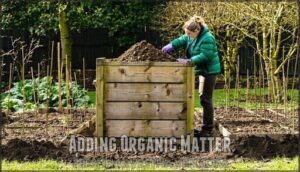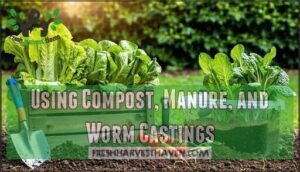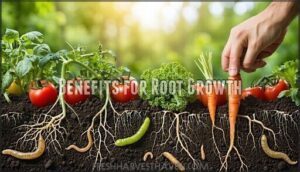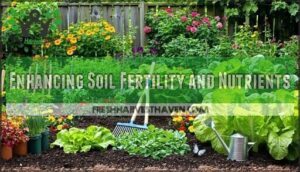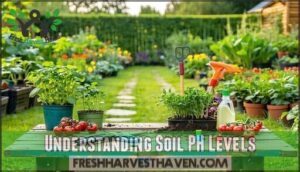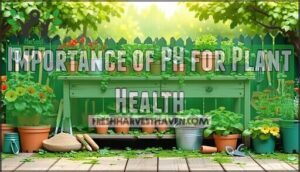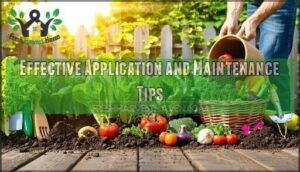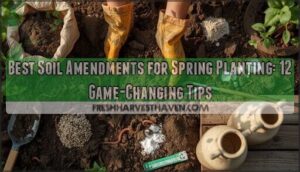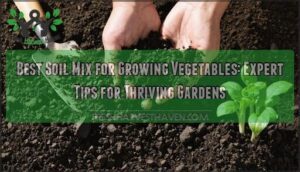This site is supported by our readers. We may earn a commission, at no cost to you, if you purchase through links.
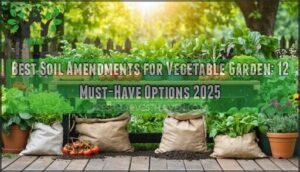
Think of these best soil amendments for vegetable garden success as building blocks—each one plays a specific purpose in creating that perfect growing environment your plants need to thrive, and combining them strategically unlocks their full potential.
Table Of Contents
- Key Takeaways
- Choosing The Best Soil Amendments
- Improving Soil Structure and Drainage
- Enhancing Soil Fertility and Nutrients
- Balancing and Managing Soil PH
- Effective Application and Maintenance Tips
- Frequently Asked Questions (FAQs)
- What are the most common soil amendments available to gardeners?
- How do I choose the best soil amendments for a vegetable garden?
- What are the best plant-based soil amendments?
- What are the best soil amendments for vegetable garden in 2025?
- What is a good organic soil amendment?
- Do you need soil amendments for your organic vegetable garden?
- What is the best soil additive for vegetable gardens?
- What is the best soil mixture for a vegetable garden?
- What are the soil amendments for vegetable gardens?
- What should I add to my soil before planting vegetables?
- Conclusion
Key Takeaways
- Start with compost as your foundation – it’s like a multivitamin for your soil that feeds beneficial microbes, improves drainage, and provides slow-release nutrients your vegetables need to thrive.
- Test your soil first, then choose amendments strategically – you can’t fix what you don’t know is broken, so get that soil test to understand pH and nutrient levels before adding anything.
- Combine organic amendments for maximum impact – aged manure delivers nitrogen, worm castings provide concentrated nutrition, and leaf mold improves water retention when used together.
- Time your applications correctly – add compost and manure in fall so they decompose over winter, giving you nutrient-rich soil ready for spring planting season.
Choosing The Best Soil Amendments
You’ll want to start with a soil test to understand what your garden actually needs, since throwing random amendments at dirt rarely works as planned.
Focus on organic options like compost and aged manure first, as they improve soil structure while feeding beneficial microbes that keep your vegetables happy and productive.
Types of Soil Amendments
You’ll find three main categories of soil amendments to transform your vegetable garden. Organic fertilizers like compost, manure types, and worm castings feed plants while building soil life.
Soil conditioners such as leaf mold and worm compost improve texture and water retention.
Organic Vs Inorganic Options
You’ll choose between organic and inorganic soil amendments based on your gardening philosophy. Organic options like compost and manure feed soil microbes while slowly releasing nutrients. Inorganic amendments work faster but don’t build long-term soil health. Understanding soil health benefits is vital for making informed decisions about soil amendments.
- Organic Matter: Compost, worm compost, and manure improve soil structure naturally
- Natural Fertilizers: Bone meal and kelp provide sustained nutrition
- Soil Conditioners: Aged organic materials improve water retention
- Compost Tea: Liquid organic amendment boosts beneficial microorganisms
- Sustainable Gardening: Organic soil amendments support ecosystem balance
Key Factors for Vegetable Gardens
Successful vegetable growing hinges on understanding your garden’s unique needs. Soil temperature affects seed germination and root development, while proper garden layout maximizes nutrient cycling.
Crop rotation prevents disease buildup and maintains soil health. Focus on soil aeration through organic soil amendments like compost during soil preparation.
These fundamentals transform ordinary dirt into thriving organic gardening gold.
Improving Soil Structure and Drainage
Your vegetable garden’s success starts with soil that breathes properly and drains excess water without becoming waterlogged.
Think of good soil structure like a chocolate chip cookie – you want those air pockets and crumbly texture that roots can easily navigate, not dense clay that suffocates your plants.
Adding Organic Matter
Organic soil amendments transform your garden’s foundation by boosting microbe balance and promoting humus formation. Adding organic compost, leaf mold, and natural fertilizers enhances soil aeration while feeding beneficial organisms.
These amendments create a living ecosystem that holds moisture yet drains well. Think of comfrey and manure as your soil’s personal trainers—they strengthen structure naturally.
Understanding organic compost benefits is essential for maintaining a healthy garden ecosystem.
Using Compost, Manure, and Worm Castings
Transform your garden’s soil biota with these three powerhouse organic soil amendments. Compost delivers slow-release nutrients while improving moisture retention—try brewing compost tea for liquid fertilization. Different manure types offer varying nitrogen levels, but always use aged varieties to prevent plant burn.
Worm castings from your own worm farming operation provide concentrated nutrients and beneficial microbes that boost organic matter decomposition and soil improvement. For ideal results, consider using a combination of materials for a soil solution that enhances overall soil health.
Benefits for Root Growth
With organic soil amendments like compost, your vegetable roots develop stronger systems that reach deeper into nutrient-rich soil. Enhanced soil aeration from organic matter boosts microbial activity, creating pathways for better water uptake and nutrient absorption.
Balanced soil pH from these amendments unlocks essential minerals, giving your plants the root depth they need to thrive.
Enhancing Soil Fertility and Nutrients
You can’t grow prize-winning tomatoes in nutrient-poor soil, which is why understanding soil fertility becomes essential for your vegetable garden’s success.
The right combination of organic amendments and natural fertilizers transforms depleted earth into a thriving ecosystem that feeds your plants exactly what they need.
Essential Nutrients for Vegetables
Your vegetable garden’s success hinges on three key nutrients that act like plant vitamins. Nutrient deficiency can slash vegetable yield dramatically, but soil microbes help deliver these essentials:
- Nitrogen – Powers leafy growth and chlorophyll production
- Phosphorus – Strengthens roots and boosts fruit development
- Potassium – Regulates water uptake and disease resistance
Understanding these fundamentals transforms your soil amendments strategy completely. To address potential issues, monitoring soil nutrient levels is vital to guarantee plant growth.
Using Fertilizers and Natural Amendments
You’ve got two paths for soil enrichment: synthetic fertilizers deliver quick nutrient boosts, while natural additives like compost, manure, and leaf mold build lasting soil health. Organic boosters such as comfrey and nutrient supplements work slower but create thriving microbial communities.
Smart gardeners combine both approaches—fertilizer types for immediate needs, natural soil amendments for long-term success. Understanding soil improvement methods is essential for maintaining a healthy and productive garden ecosystem.
Role of Green Manure and Cover Crops
Planting cover crops creates a living soil amendment that works while you’re not gardening. These nitrogen fixers transform atmospheric nitrogen into plant-available nutrients through their root systems.
- Legume cover crops (clover, vetch, peas) excel at nitrogen fixation for next season’s vegetables
- Grass covers (rye, oats) prevent soil erosion and add organic matter when tilled under
- Brassica covers (radishes, mustard) break up compacted soil with deep taproots naturally
- Mixed plantings combine green manure benefits with diverse root structures for soil health
Crop rotation strategies using covers between seasons maintain soil fertility without purchased fertilizers.
Balancing and Managing Soil PH
You can’t grow healthy vegetables if your soil’s pH is off, since most veggies need a slightly acidic to neutral range between 6.0 and 7.0 to absorb nutrients properly.
Think of pH as your soil’s mood meter—too high or low, and your plants become cranky and won’t eat their dinner, no matter how many amendments you add.
Understanding Soil PH Levels
Soil pH testing reveals whether your dirt is acidic soil or alkaline. Most vegetables thrive between pH 6.0-7.0, but some acid-loving plants prefer lower levels.
Your soil test shows nutrient availability depends heavily on pH level – too high or low blocks essential minerals. Understanding these alkaline limits helps you choose the right pH balancing approach.
Soil pH management starts with knowing your baseline numbers.
Adjusting PH With Lime or Sulfur
Getting your soil pH just right often requires strategic lime application or sulfur usage. Soil pH testing reveals whether you need acidic correction or alkaline adjustment. Garden lime raises pH in acidic soils, while sulfur lowers pH in alkaline conditions.
- Apply 2-3 pounds dolomitic lime per 100 square feet for most vegetable gardens
- Use sulfur at 1-2 pounds per 100 square feet to reduce alkalinity
- Incorporate amendments 2-3 months before planting for maximum effectiveness
- Split applications between spring and fall for established gardens
Importance of PH for Plant Health
Your pH levels act like a gatekeeper for nutrient uptake in your vegetable garden. When soil acidity strays too far from the sweet spot, plants can’t absorb nutrients properly, even with perfect soil amendments.
Most vegetables thrive in slightly acidic to neutral pH ranges, where soil buffering allows ideal plant tolerance. Understanding soil pH management helps you match acid-loving plants with appropriate conditions while avoiding alkaline soil problems.
Effective soil health improvement techniques are essential for maintaining ideal soil conditions.
Effective Application and Maintenance Tips
You’ll get the best results from your soil amendments when you time them right and apply them properly. Think of it like cooking – even the best ingredients won’t work if you add them at the wrong time or in the wrong amounts.
Timing and Methods for Adding Amendments
Timing makes all the difference when adding soil amendments to your vegetable garden. Fall application works best for compost and manure, giving organic matter months to decompose before spring preparation begins.
Mix amendments during soil aeration when the ground isn’t waterlogged. Blend compost timing with your planting schedule for maximum nutrient availability during the growing season.
Safety Precautions and Best Practices
Personal protection should be your first line of defense when handling soil amendments and compost. Always wear gloves during safe handling to prevent cuts from debris or exposure to pathogens. Use dust masks when applying dry amendments to protect your lungs.
Store organic gardening methods materials properly and maintain clean equipment maintenance routines. Practice proper waste disposal for unused amendments.
Soil testing before application prevents over-amendments that could harm plants.
Monitoring and Adjusting Soil Health
Keeping tabs on your garden’s underground ecosystem isn’t rocket science. Test soil annually using basic soil testing methods to track nutrient cycling and microbial balance.
Check for proper soil aeration, erosion control effectiveness, and organic matter levels. Adjust soil pH management strategies based on results.
Add compost or targeted soil amendments when your soil test reveals deficiencies.
Frequently Asked Questions (FAQs)
What are the most common soil amendments available to gardeners?
You’ll find compost, aged manure, and worm castings are the most popular choices. These organic amendments boost soil structure while adding nutrients your plants crave naturally.
How do I choose the best soil amendments for a vegetable garden?
What’s your soil telling you? Start with a soil test to reveal pH and nutrient levels.
Choose compost for structure, aged manure for nutrients, or worm castings for gentle feeding based on your test results.
What are the best plant-based soil amendments?
Compost tops the list – it’s your garden’s best friend. Add leaf mold, grass clippings, and shredded bark for drainage. Green manure crops like clover fix nitrogen naturally.
What are the best soil amendments for vegetable garden in 2025?
Think of soil like a hungry teenager – it needs constant feeding! You’ll want compost, aged manure, and worm castings as your vegetable garden’s "superfood trio" this year for maximum growth.
What is a good organic soil amendment?
You’ll love compost—it’s nature’s perfect multitasker that feeds your plants while improving soil structure. Worm castings work wonders too, adding nutrients and beneficial microbes that boost plant health naturally.
Do you need soil amendments for your organic vegetable garden?
Good soil feeds the gardener’s soul" – absolutely, you’ll need amendments for your organic garden!
Most native soil lacks the nutrients and structure vegetables crave, so adding compost, aged manure, or worm castings transforms poor dirt into plant paradise.
What is the best soil additive for vegetable gardens?
Your garden’s secret weapon? Well-aged compost reigns dominant, followed closely by worm castings.
These powerhouse amendments boost nutrients, improve drainage, and create the soil structure your vegetables crave for explosive growth.
What is the best soil mixture for a vegetable garden?
You’ll want equal parts loamy soil, compost, and aged manure mixed together. This blend provides nutrients, drainage, and water retention your vegetables crave for ideal growth.
What are the soil amendments for vegetable gardens?
Like building blocks for your garden’s foundation, you’ll want compost, aged manure, and worm castings.
These organic amendments boost nutrients, improve soil structure, and support beneficial microbes that keep your vegetables thriving year-round.
What should I add to my soil before planting vegetables?
Add compost or aged manure two weeks before planting. You’ll boost soil structure and nutrients while supporting beneficial microbes that vegetables crave for healthy growth.
Conclusion
Picture your vegetable garden as a thriving underground city where billions of microorganisms work tirelessly to feed your plants. The best soil amendments for vegetable garden success transform ordinary dirt into this living ecosystem.
You’ve learned about compost’s magic, aged manure’s gentle power, and worm castings’ concentrated nutrition. Remember that bone meal provides steady phosphorus while kelp delivers ocean minerals your vegetables crave.
Start with one or two amendments, then gradually build your soil’s health over time for outstanding harvests.
- https://fieldreport.caes.uga.edu/news/compost-enriches-soil-but-doesnt-replace-fertilizer/
- https://www.epa.gov/recycle/composting-home
- https://www.reddit.com/r/vegetablegardening/comments/1beqb5m/soil_additives_for_vegetables/
- https://www.nature.com/articles/s41598-021-82739-7
- https://www.foodprotection.org/members/fpt-archive-articles/2018-09-assessment-of-current-practices-of-organic-farmers-regarding-biological-soil-amendments-of-a/

